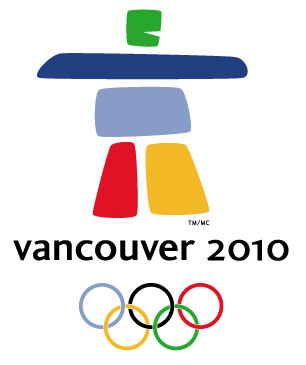2010 Winter Olympics
The 2010 winter olympics, officially the XXI Olympic Winter Games or the 21st Winter Olympics, is a major international multi-sport events held on February 12–28, 2010, in Vancouver, British Columbia, Canada, with some events held in the resort town of Whistler, British Columbia and in the Vancouver suburbs of Richmond, West Vancouver and the University Endowment Lands. Both the Olympic and Paralympic Games are being organized by the Vancouver Organizing Committee (VANOC). The 2010 Winter Olympics are the third Olympics hosted by Canada, and the first by the province of British Columbia. Previously, Canada was home to the 1976 Summer Olympics in Montreal, Quebec and the 1988 Winter Olympics in Calgary, Alberta.
Following Olympic tradition, then Vancouver mayor Sam Sullivan received the Olympic flag during the closing ceremony of the 2006 Winter Olympics in Turin, Italy. The flag was raised on February 28, 2006, in a special ceremony, and was on display at Vancouver City Hall until the Olympic opening ceremony. The event was officially opened by Governor General Michaëlle Jean.
Bid and preparations
The Canadian Olympic Association chose Vancouver as the Canadian candidate city over Calgary, which sought to re-host the games and Quebec City, which had lost the 2002 Olympic bid in 1995. On the first round of voting on November 21, 1998, Vancouver-Whistler had 26 votes, Quebec City with 25 and Calgary 21. On December 3, 1998, the second and final round of voting occurred between the two leading contenders, which saw Vancouver win with 40 votes compared to Quebec City’s 32. The win allowed Vancouver to prepare its bid and begin lobbying efforts internationally.[citation needed]
After the bid bribing scandal that took place with the 2002 Winter Olympics at Salt Lake City (which saw Quebec City asking for compensation (C$8 million) for their failed 2002 bid), 1999 saw many of the rules around the bidding process change. The IOC created the Evaluation Commission which was appointed on October 24, 2002. Prior to the bidding for the 2008 Summer Olympics, often host cities would fly members of the IOC to their city where they toured the city and were provided with gifts from the city. The lack of oversight and transparency often led to allegations of money for votes. Afterward, changes brought forth by the IOC bidding rules were tightened, and more focused on technical aspects of candidate cities. The team analysed the candidate city features and provided its input back to the IOC. The bid books from the three candidate cities were submitted in January 2003 and inspections occurred before May 2003, when the final report was submitted.[citation needed]
Vancouver won the bidding process to host the Olympics by a vote of the International Olympic Committee on July 2, 2003, at the 115th IOC Session held in Prague, Czech Republic. The result was announced by IOC President Jacques Rogge. Vancouver faced two other finalists shortlisted that same February: PyeongChang, South Korea, and Salzburg, Austria. Pyeongchang had the most votes of the three cities in the first round of voting, in which Salzburg was eliminated. In the run-off, all but two of the members who had voted for Salzburg voted for Vancouver. It was the closest vote by the IOC since Sydney, Australia beat Beijing for the 2000 Summer Olympics by 2 votes. Vancouver’s victory came almost 2 years after Toronto’s 2008 Summer Olympic bid was defeated by Beijing in a landslide vote.
The British Columbia government also indicated it would pay for a $600 million upgrade of the Sea-to-Sky Highway to accommodate increased traffic between Vancouver and Whistler.
The Vancouver Olympic Committee (VANOC) spent $16.6 million on upgrading facilities at Cypress Mountain, which hosts the freestyle (aerials, moguls, ski cross) and snowboarding events. The athletes’ villages in Whistler and Vancouver are now complete, as are the main media centre in Coal Harbour and its Whistler counterpart.
With the opening in February 2009 of the $40-million Vancouver Olympic/Paralympic Centre at Hillcrest Park which hosts curling, every sports venue for the 2010 games was completed on time and at least one year prior to the games.
Costs
In 2004, the operational cost of the 2010 Winter Olympics was estimated to be Canadian $1.354 billion. As of mid-2009 it is projected to be $1.76 billion,[9] all raised from non-government sources,[citation needed] primarily through sponsorships and the auction of national broadcasting rights. $580 million is the taxpayer-supported budget to construct or renovate venues throughout Vancouver and Whistler, $200 million was expected to be spent for security, of which the Royal Canadian Mounted Police (RCMP) is the lead agency. That number was later revealed to be in the region of $1 billion, an amount in excess of five times what was originally estimated.[10] As of the start of February 2010, the total cost of the Games, including all the infrastructure improvements for the region that occurred is estimated to be $6 billion, with $600 million of the spending directly related to hosting the games. Projected benefits and revenues to the city and province are projected to be in the range of $10 billion, with a Price-Waterhouse report indicating that the projected direct revenues will be in the range of $1 billion.
Sports
Fifteen winter sports events have been announced as part of the 2010 Winter Olympics. The eight sports categorized as ice sports are: bobsled, luge, skeleton, ice hockey, figure skating, speed skating, short track speed skating and curling. The three sports categorized as alpine skiing and snowboarding events are: alpine, freestyle and snowboarding. The four sports categorized as Nordic events are: biathlon, cross country skiing, ski jumping and nordic combined.
Numbers in parentheses indicate the number of medal events contested in each sport.
